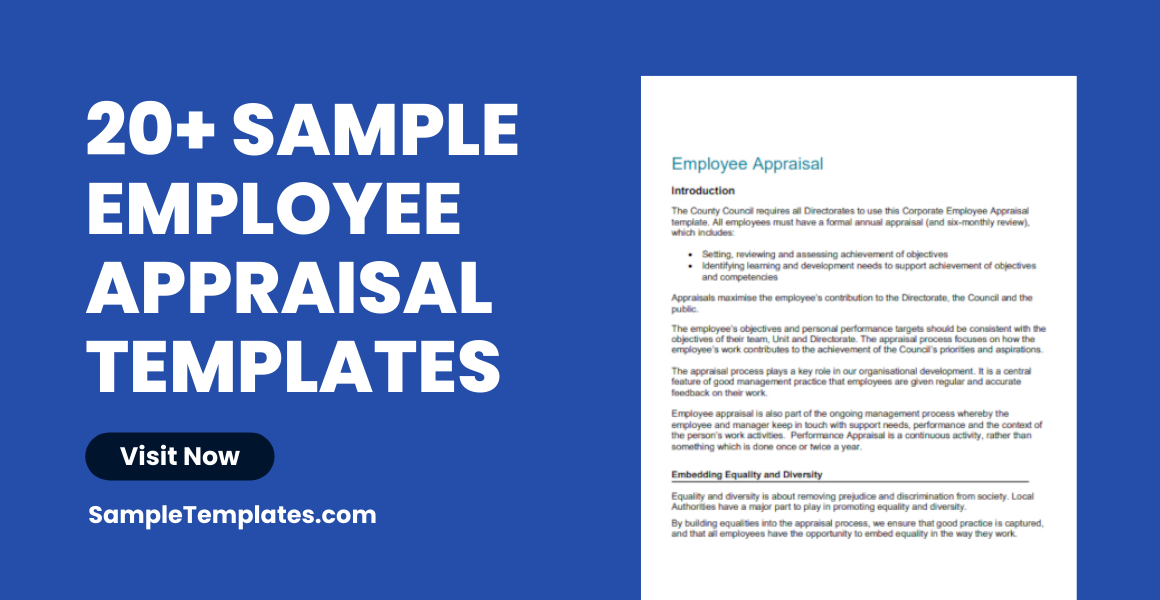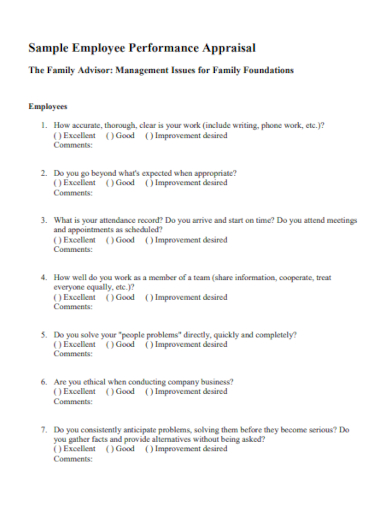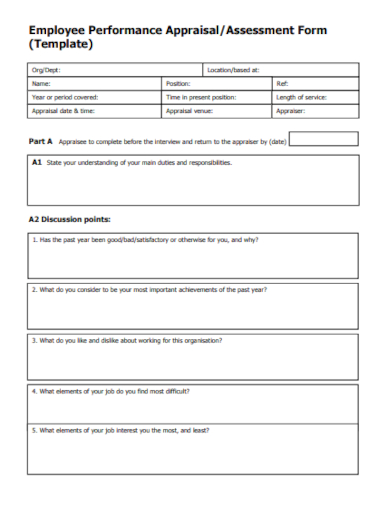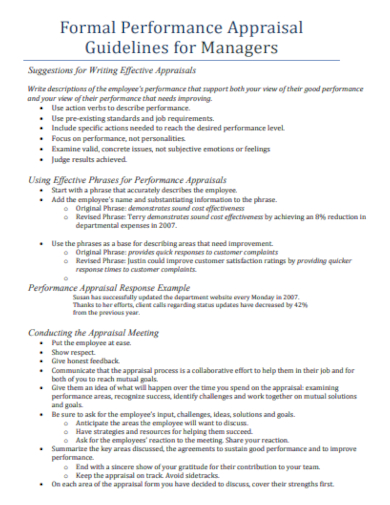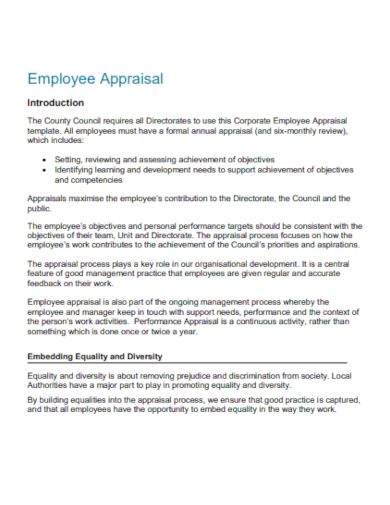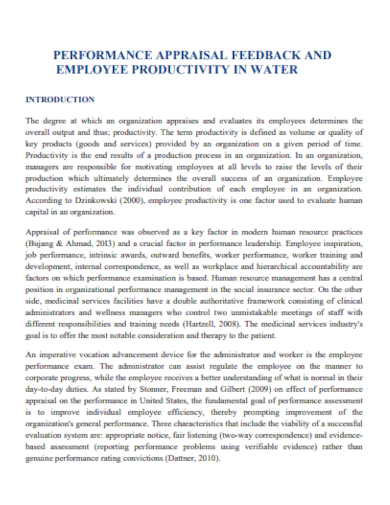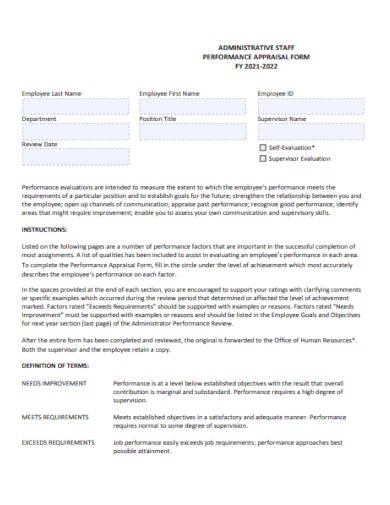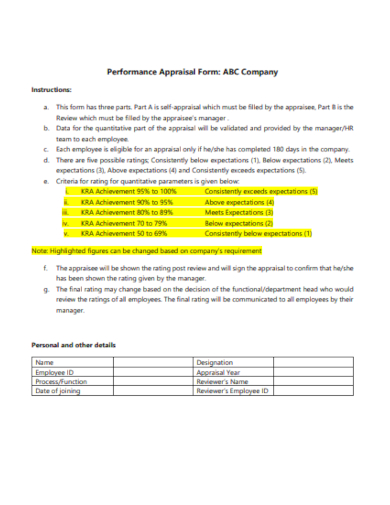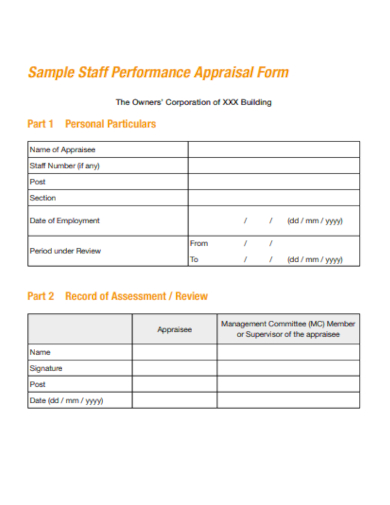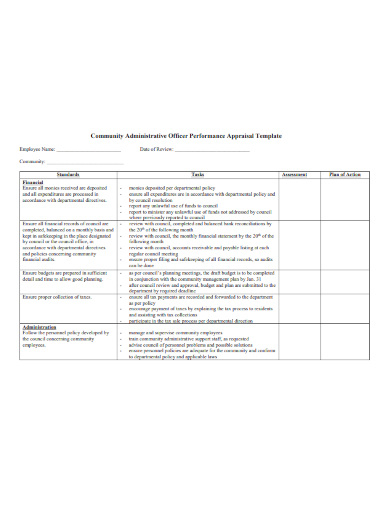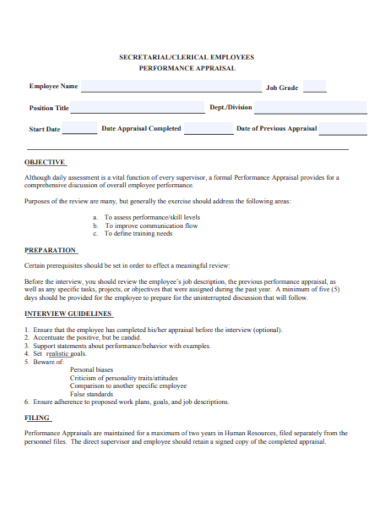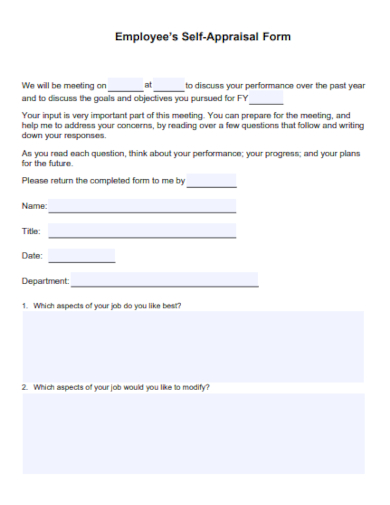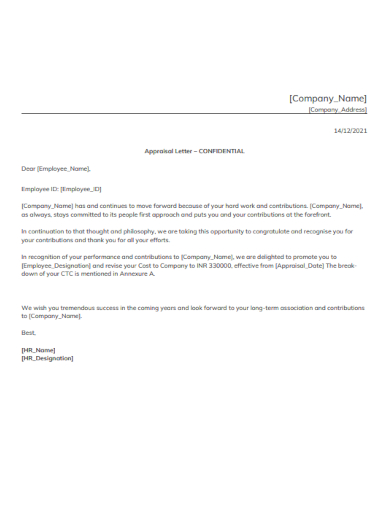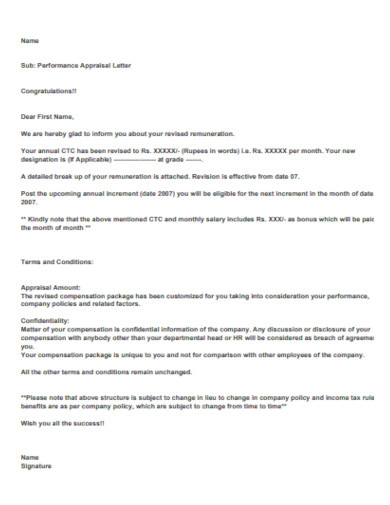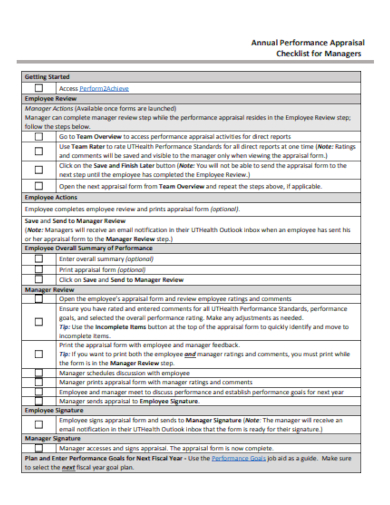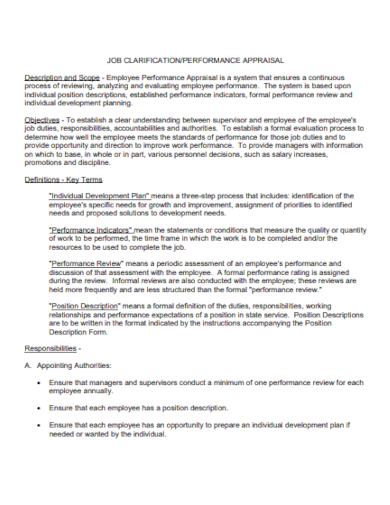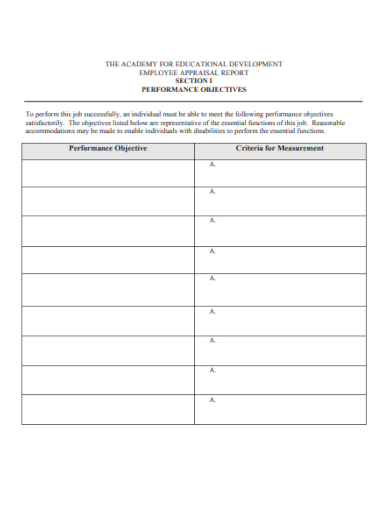Step into the future of employee performance assessment with our meticulously crafted Employee Appraisal Template. This versatile tool is designed to simplify and optimize your evaluation process, promoting enhanced productivity and seamless communication. Packed with keyword-rich features, our template empowers you to harness data-driven insights for more effective workforce management. Embrace a new era of performance evaluation and take the lead in shaping a brighter future for your organization with our user-friendly appraisal solution.
20+ Employee Appraisal Samples
1. Employee Appraisal Form Template
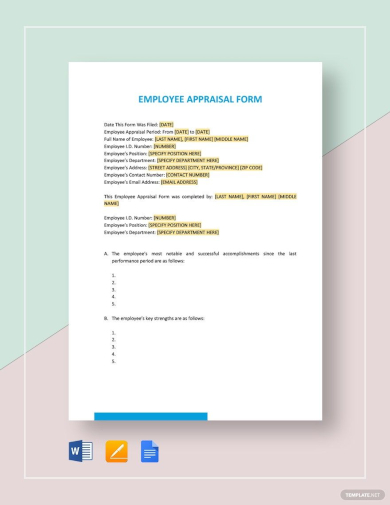
2. Employee Appraisal Letter Template
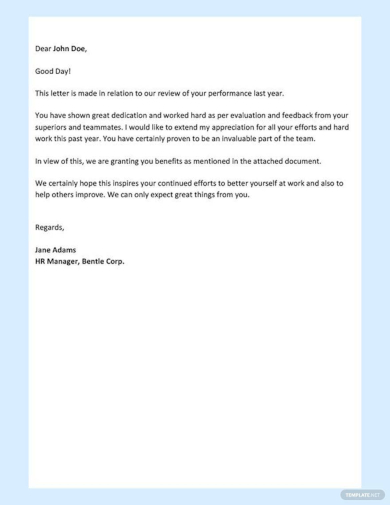
3. Restaurant Employee Appraisal Form Template
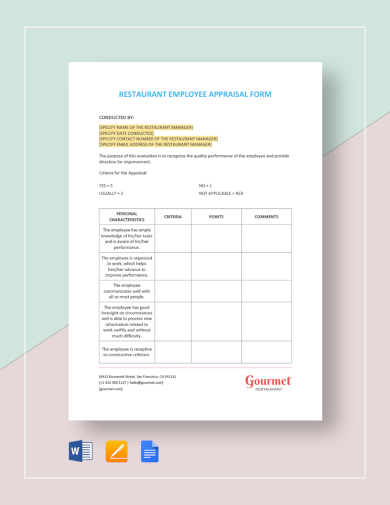
4. Employee Performance Appraisal Letter Template
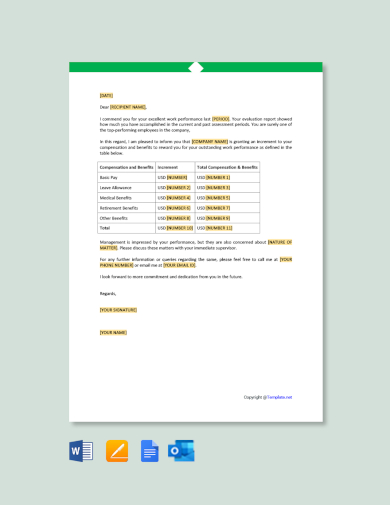
5. Sample Employee Appraisal Form Template
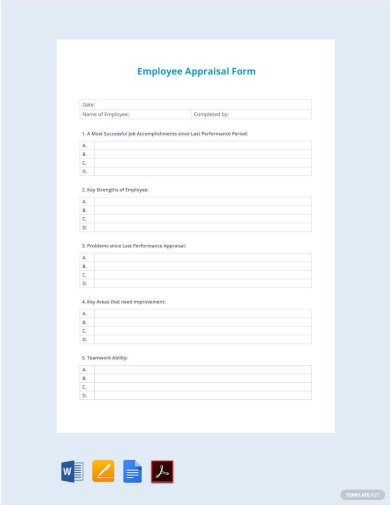
What is a Performance Appraisal?
A performance appraisal, often referred to as a performance review or evaluation, is a structured process through which employers assess and evaluate the job performance of their employees. This process serves as a critical component of talent management within organizations and is typically conducted periodically, such as annually or semi-annually. The primary purpose of a performance appraisal is to provide employees with constructive feedback on their job performance, recognize their achievements, identify areas for improvement, and establish goals and expectations for the future.
Here are some key aspects of performance appraisals:
- Evaluation Criteria: During a performance appraisal, employees are assessed based on specific criteria and standards that are relevant to their job roles and responsibilities. These criteria can include job knowledge, productivity, quality of work, teamwork, communication skills, and more.
- Feedback: Performance appraisals provide a platform for managers to offer feedback to employees regarding their strengths and weaknesses. This feedback can be both positive, acknowledging accomplishments and contributions, and constructive, identifying areas where improvement is needed.
- Goal Setting: Appraisals often involve setting performance goals and objectives for the upcoming period. These goals help employees understand what is expected of them and can serve as a roadmap for their professional development.
- Career Development: Performance appraisals also play a crucial role in career development. Managers and employees can discuss career aspirations, training opportunities, and potential career paths within the organization.
- Compensation and Rewards: In many organizations, performance appraisals are tied to compensation decisions. High-performing employees may be eligible for salary increases, bonuses, or other rewards, while those with unsatisfactory performance may face consequences such as a lack of salary growth.
- Documentation: Performance appraisals typically involve documentation of the evaluation process. This documentation serves as a record of the employee’s performance history and may be used for reference in future appraisals or HR-related decisions.
- Legal Compliance: It’s important for organizations to conduct performance appraisals in compliance with applicable laws and regulations. This includes ensuring fairness, avoiding discrimination, and maintaining confidentiality.
- Continuous Improvement: The insights gained from performance appraisals can also contribute to organizational improvement. Identifying areas of weakness or inefficiency in the workforce can lead to strategic changes and training initiatives.
A performance appraisal is a systematic and organized process that allows employers to assess and manage the performance of their employees. When conducted effectively, it can lead to improved employee motivation, productivity, and overall organizational success. It also provides a platform for open communication between managers and employees, fostering a culture of continuous improvement and development within the workplace.
6. Sample Employee Performance Appraisal
7. Employee Appraisal Self Assessment
8. Manager Employee Performance Appraisal
9. Employee Work Appraisal
10. Employee Feedback Appraisal
11. Staff Performance Appraisal Form
Understanding employee appraisals?
Employee appraisals, also known as performance appraisals or reviews, are a fundamental aspect of human resource management within organizations. These structured evaluations provide a means for employers to assess and analyze an employee’s performance, contributions, and potential for growth within the company. Understanding employee appraisals is crucial for both employers and employees, as they serve various essential functions in the workplace.
Key Components of Employee Appraisals:
- Assessment: Employee appraisals involve a comprehensive assessment of an individual’s performance against predetermined criteria and goals. These criteria often include job-related skills, competencies, and behaviors that align with the organization’s objectives.
- Feedback: The appraisal process offers employees constructive feedback on their strengths and weaknesses. This feedback can be used for self-improvement and skill development, fostering personal and professional growth.
- Goal Setting: Employee appraisals are an opportunity for managers and employees to set clear performance goals and expectations for the future. Establishing these sample goals helps align individual efforts with the organization’s strategic objectives.
- Recognition: High-performing employees are typically acknowledged and recognized during the appraisal process. Recognition can come in the form of praise, promotions, salary increases, or other incentives, which can boost employee morale and motivation.
- Career Development: Appraisals often include discussions about an employee’s career path within the organization. These conversations can lead to the identification of potential career advancement opportunities, training needs, and skill development plans.
- Documentation: Appraisal records serve as an essential part of an employee’s personnel file. They provide a historical record of an employee’s performance, which can be used for future reference, decision-making, and dispute resolution.
Benefits of Employee Appraisals:
- Improved Performance: Regular appraisals can lead to enhanced employee performance as they provide clear expectations and guidance for improvement.
- Enhanced Communication: Appraisals foster open and honest communication between employees and managers, strengthening the working relationship.
- Motivation: Recognition and rewards for good performance can motivate employees to continue delivering their best efforts.
- Development: Appraisals identify areas where employees may need additional training or development, which can lead to skill enhancement and career growth.
- Goal Alignment: Appraisals ensure that individual goals are aligned with the organization’s objectives, promoting synergy within the workforce.
- Legal Compliance: Properly conducted appraisals can help organizations demonstrate fair and consistent treatment of employees, reducing the risk of legal disputes.
It’s essential to conduct employee appraisals in a fair, consistent, and objective manner to ensure their effectiveness. This involves providing regular feedback, setting clear expectations, and involving employees in the process to foster a sense of ownership and engagement.
Understanding employee appraisals is critical for promoting employee development, organizational growth, and a positive workplace culture. When executed effectively, these evaluations contribute to improved performance, enhanced communication, and increased employee satisfaction, ultimately benefiting both individuals and the organization as a whole.
12. Basic Employee Appraisal
13. Employee Personal Appraisal
14. Employee Appraisal in PDF
15. Secretary Employee Appraisal
Components of an Effective Employee Appraisa?
An effective employee appraisal is a vital tool in managing and improving workforce performance within an organization. It involves a systematic assessment of an employee’s job performance, contributions, and development needs. To ensure the appraisal process is meaningful and productive, several key components need to be in place:
- Clear Objectives and Criteria: The foundation of any successful employee appraisal is a well-defined set of objectives and criteria. These should be established in advance and communicated to both employees and managers. Clear criteria ensure that the appraisal process remains focused and consistent, making it easier to evaluate performance objectively.
- Regular Feedback: Effective appraisals are not a one-time event but rather an ongoing process. Regular feedback and communication between managers and employees should occur throughout the year. This helps employees understand their progress and areas needing improvement, reducing surprises during the formal appraisal.
- Goal Setting: Employee appraisals provide an opportunity to set specific and measurable performance goals for the future. These goals should align with the organization’s objectives and be discussed collaboratively between employees and managers. Clear goals help motivate employees and provide direction for their work.
- Self-Assessment: Encouraging employees to self-assess their performance is a valuable component of appraisals. This self-reflection promotes self-awareness and encourages employees to take ownership of their development.
- Documentation: Thorough record-keeping is crucial for documenting performance over time. This documentation includes achievements, areas for improvement, feedback, and any agreed-upon action plans. It serves as a historical reference for future appraisals and decision-making processes.
- Training and Development Plans: Effective appraisals identify areas where employees may need additional training or development opportunities. Creating individualized development plans helps employees acquire new skills and improve in areas of weakness, benefiting both the employee and the organization.
- Two-Way Communication: Appraisals should be a two-way dialogue between the employee and the manager. Employees should have the opportunity to share their perspectives, concerns, and career aspirations during the appraisal discussion.
- Recognition and Rewards: Recognizing and rewarding high-performing employees is an essential component of effective appraisals. This recognition can take the form of praise, bonuses, promotions, or other incentives. It reinforces positive behavior and motivates employees to continue performing at a high level.
- Manager Training: Managers who conduct appraisals should receive training on effective appraisal techniques, communication, and feedback. A well-prepared manager is better equipped to conduct fair and constructive appraisals.
- Fairness and Consistency: Appraisals must be conducted in a fair and consistent manner across the organization. All employees should be evaluated using the same criteria and standards, without bias or discrimination.
- Follow-Up: After the appraisal, follow-up is essential. Managers should regularly check in with employees to track progress toward established goals and offer additional feedback and support as needed.
- Performance Improvement Plans (PIPs): In cases where employees are not meeting performance expectations, an effective appraisal process includes the development and implementation of Performance Improvement Plans (PIPs). These plans outline specific actions and timelines for improvement.
An effective employee appraisal is a multi-faceted process that involves clear objectives, regular feedback, goal setting, documentation, training and development, and fair and consistent evaluation. When conducted correctly, employee appraisals contribute to enhanced performance, employee satisfaction, and organizational success.
16. Employee Self-Appraisal Form
17. Employee Appraisal Letter Format
18. Standard Employee Performance Appraisal Letter
19. Annual Employee Appraisal Checklist
20. Employee Job Performance Appraisal
21. Employee Appraisal Report
Tips for Using Employee Appraisal Effectively
Effectively using employee appraisals is essential for both employee development and organizational success. Here are some valuable tips to ensure that the appraisal process is meaningful and productive:
Prepare in Advance: Before conducting employee appraisals, managers should thoroughly prepare by reviewing employee performance data, setting specific objectives for the appraisal discussion, and collecting relevant feedback from colleagues and peers.
Regular Feedback: Appraisals should not be the only time when feedback is provided. Regular, ongoing feedback throughout the year helps employees understand their progress, strengths, and areas for improvement, reducing surprises during formal appraisals.
Objective Evaluation: Focus on objective criteria when evaluating employee performance. Use established job descriptions, performance metrics, and key performance indicators (KPIs) to assess performance, rather than relying solely on subjective opinions.
Open Communication: Foster open and honest communication during the appraisal process. Encourage employees to share their perspectives, concerns, and career aspirations. Listen actively and address any questions or issues that arise.
Set Clear Goals: Work with employees to set clear and achievable performance goals for the future. Ensure that these goals align with the organization’s objectives and are specific, measurable, and time-bound (SMART goals).
Acknowledge Achievements: Recognize and celebrate employees’ accomplishments and contributions. Positive reinforcement can motivate employees to continue performing at a high level.
Constructive Criticism: When addressing areas for improvement, provide constructive criticism rather than criticism for its own sake. Offer specific examples and suggestions for how employees can enhance their performance.
Individualized Development Plans: Create individualized development plans for each employee based on their appraisal results. These plans should outline training and development opportunities to help employees acquire new skills and improve in areas of weakness.
Regular Follow-Up: After the appraisal, establish a schedule for follow-up meetings to track progress toward established goals and address any issues or challenges that arise. Consistent follow-up ensures that employees stay on track and receive ongoing support.
Manager Training: Provide training to managers who conduct appraisals. Training should cover effective appraisal techniques, communication skills, and strategies for delivering feedback. A well-prepared manager is more likely to conduct fair and constructive appraisals.
Tips for Using Employee Appraisal Effectively
Fairness and Consistency: Ensure that the appraisal process is fair and consistent across the organization. All employees should be evaluated using the same criteria and standards, and there should be no bias or discrimination in the assessment process.
Employee Involvement: Involve employees in the appraisal process by encouraging them to self-assess their performance, provide input, and actively participate in goal-setting discussions. This promotes a sense of ownership and engagement.
Legal Compliance: Be aware of and adhere to relevant employment laws and regulations during the appraisal process. This includes maintaining confidentiality and avoiding discrimination.
Continuous Improvement: Continuously assess and improve the appraisal process itself. Solicit feedback from employees and managers to identify areas where the process can be enhanced.
Using employee appraisals effectively involves careful preparation, regular feedback, objective evaluation, open communication, goal setting, acknowledgment of achievements, and constructive criticism. When conducted thoughtfully and consistently, employee appraisals contribute to improved performance, employee development, and organizational success.
Related Posts
Retirement Speech Samples & Templates
Weekly Schedule Samples & Templates
Contractual Agreement Samples & Templates
FREE 9+ Amazing Sample Church Bulletin Templates in PSD | PDF
Sample Business Card Templates
Sample Cashier Job Descriptions
Questionnaire Samples
FREE 10+ Sample HR Resource Templates in PDF
FREE 49+ Sample Job Descriptions in PDF | MS Word
FREE 23+ Sample Event Calendar Templates in PDF | MS Word | Google Docs | Apple Pages
Company Profile Samples
FREE 10+ Leadership Report Samples [ Development, Training, Camp ]
FREE 24+ Sample Payment Schedules in PDF | MS Word
FREE 10+ Return to Work Action Plan Samples in PDF | DOC
Autobiography Samples & Templates
